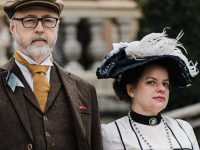Disclaimer: The opinions expressed herein are those of the authors and do not necessarily reflect the official policy or position of Nordiclarp.org or any larp community at large.
This article is Part 1 in a series on Grooming in the Larp Community.
Content Advisory: Sexual abuse, mental health issues.
On a bus on my way to Poland, I met Julie, and we struck up a conversation.
It is pretty commonly known that teenage girls can come off as deceptively mature, but as someone who has worked professionally with teenagers, I am not usually surprised about people’s age. In Julie’s case,[1]This article uses anonymised names. The real names are only known to the author. she certainly seemed mentally older than her 19 years. It did not occur to me at the time that her maturity might have had a cost.
We found out that we had a lot in common and agreed to meet up for coffee once we were back home. It was only after a few talks that I came to know of the things she had been through.
Role-playing is a hobby that spans the gap between adults and children. While this gives us a great opportunity to interact with and even form friendships with people outside our own age group, it also means that romantic and sexual relationships occur. In that sense, role-playing isn’t different from football, basketball, scouts, and many other hobbies. The difference is that in role-playing, there are no clear guidelines to what is acceptable or what is not. As opposed to e.g. the 113-years-old scouts movement, we are a young hobby without an established hierarchy or procedures.
I have noticed that many people are accepting of these relationships. But should they be? Does love conquer all differences — including age?
Are Relationships between Teenagers and Adults Harmful?
As it turned out, Julie was one of the many young role-players who had experienced grooming.
According to the Cambridge Dictionary, grooming is “the criminal activity of becoming friends with a child in order to try to persuade the child to have a sexual relationship.”[2]Cambridge Dictionary. N.d. “Grooming.” Cambridge Dictionary And that is exactly what happened to Julie, with role-playing as a backdrop.
Julie described herself as having been a lonely child. She felt ostracized at school — people would bully her for being a nerd. She was preoccupied with manga, Harry Potter, and games, while her classmates were discussing boys and make-up.
Things were not easy at home. Julie’s parents had divorced when she was five. Her mother, whom she lived with most of the time had found a new husband — one who didn’t like kids, and had very strict rules. He wedged himself between Julie and her mother, and expressed how much he looked forward to the day when she was old enough to leave home. Her father, on the other hand, would alternate between harsh criticism and undeserved praise.
Julie told me of how she got into contact with her abuser, “When I met H, I was 12 years old and starving for kindness and acceptance, and when he offered it to me, I ate it all up. You get less picky when you are really, really hungry.”
H. worked in an after-school youth club (a common form of childcare facility in Denmark). Julie described him as “the coolest adult ever.” He was a larper, and he organised trips for the kids to go larping. Also, he told Julie that she was his favourite.
When Julie was 13, H. began inviting her back to his place, where they could be alone. He would also take her out to sushi restaurants. One evening, after a visit to a restaurant, H. took Julie to a secluded wooden shelter in the forest and had her perform oral sex on him.
“I remember throwing up and shaking with disgust,” said Julie. “But I also felt so happy I could scream that I was his favorite.”
The Price of Belonging to a Community
For Julie, the pain and disgust were a price she was willing to pay for H’s attention.
At the same time, H also began taking Julie to adult larps. He had to sign a form saying that he would take responsibility for Julie while she was at the larp since she was underage. It was like the wolf signing for the sheep.
“I was so proud,” said Julie. “He told me to lie to the other participants and tell them I was 14. That way they would accept us more easily, he said.”
H also brought Julie along to his boardgaming events. Julie estimated that she was the only person under the age of 30 at those sessions. She knew that the people she met there were not really her friends — she was seen as an extension of H — and she knew it. Still, it was better than not having a social life.
As Julie got older, H’s demands got worse. Although she still slept at home during weekdays, she visited him every day in his small flat, and played along with his make-believe. It was like they were role-playing an adult couple.
“I was so grateful for the company and I would let him perform more and more different sexual acts on me as the previous ones got boring to him,” Julie explained. Along with the one-sided sex, he also became more controlling. He demanded that Julie count calories in order to stay skinny, and she had to remove all body hair. She began to develop an eating disorder. Starvation made her exhausted, and she barely had energy left for anything else.
When Julie started high school, she somehow found the strength to leave H. She had fallen in love with a boy at school, and that gave her a reason to move on. “I guess I had a glimpse of something different,” she said. “Could I just be a normal person going to school, having a boyfriend, going out after school instead of having to get the first train back so I could do the dishes of this adult man who had become my life?”

An anti-abuse event in Berlin. Photo by Mika Baumeister on Unsplash.
Where are the Parents?
Here is another account, as seen from the point of view of a mother.
Karin was the mother of a happy and smart 13 year-old who happened to love larping. She described her family as pretty harmonious. She and her husband were divorced, but had a very friendly relationship, and were good at working together when it came to the children.
Like Julie, Karin’s daughter had a lot of adults around her. Also like Julie, her daughter was perceived as being mature for her age.
Karin saw herself as a liberal person. She thought there were lots of things children could learn from having adult friends, and she loved the role-playing community. Trusting that her friends would protect her daughter from harm, she let them look after her. Little did she know that these so-called friends were using her young daughter for sex behind her back.
It was statutory rape, but at the time, Karin’s daughter would have denied it.
“The problem is that people are very focused on ‘no means no’,” Karin explained to me. “But teenagers don’t say no. They say a resounding ‘yes’. They agree, body and soul, to having sex with this adult who is so interested in them.”
And she continues,“Children have no idea what that yes means. They just don’t know. They might also think that downing an entire bottle of vodka might be a good idea, even though it might actually kill them.”
It took many years before Karin realised what had been going on. In the beginning, her daughter told her nothing, but she started getting ill. She suffered from shattering depression and had trouble with her studies. Karin was confused: What had happened to her lively, intelligent child? Only when her daughter was in her late teens did she start talking about what had happened. Her daughter had kept it all secret.
When Karin found out, she immediately contacted the police. Both men were sentenced and went to jail.
As for Julie, she and her mother went through a period of estrangement. H had told Julie not to trust her own mother: “She just wanted to separate us because she didn’t understand our love,” was what he told her.
Julie’s mother accepted that there was nothing she could do. Even when Julie told me about her experiences, she believed she would have threatened to run away and never see her mother again if her mother had reported H to the police. That is how much of a hold he had over her.
The Role of the Larping Community
Thinking about Julie and Karin’s experiences, I feel ashamed. Ashamed of the larp community — my community — but also on a personal level. This has been going on since I started larping. Why haven’t I done anything about it?
You might think that what happened to Julie and Karin is unique or at least rare. Unfortunately, that is not the case.
I am one of the witnesses who is here to tell you differently.
So why did I not react?
Because I didn’t know any better. I was repeatedly told by both the abusers and their friends that I needed to accept these relationships. I was even told by the children themselves to mind my own business.
There are some very strong voices within the Danish community that are telling us to be open and accepting to all types of love, no matter what the age difference might be. Asking questions is perceived as “ageist.” Not accepting relationships between adults and teenagers is framed as prudish and meddlesome.
The general position at Danish larps and larp conventions is that unless there is a conviction, there is no reason to call out the behaviour. People who are known to have repeatedly dated very young larpers are able to use our community to pick up teens.
However, to Julie it turned out that even a conviction didn’t change how people saw the relationship she had been in with H. In the beginning of 2018, Julie went to the police. She went through a mentally draining procedure where the police questioned everything she put forward and demanded evidence of her.
Once confronted with his actions, H. denied having had sex with Julie while he was still working at the youth club. Since it had only happened while they were alone, Julie had no way of proving her accusation.
In December of 2018, the case went to court. H. was sentenced with a fine and community service.
After the sentence, Julie experienced a backlash from the Danish role-playing community. H. was part of an extensive network of friends who were willing to support him, and who attacked Julie for having taken him to court. The general feeling was that she had been a willing participant, and old enough to be taken to account for her choices. They saw the charges as an attempt to ‘ruin’ H.
Anyway, if she was not happy in the relationship, why did she stay so long?
“Can you know that you are unhappy, even if all you’ve ever experienced are different flavors of misery? I don’t want to sound overly dramatic, but that was my situation,” Julie explained to me, when I asked her the same question.
Within the Danish community, there are several examples of well-liked and influential roleplayers who have had relationships with either young teenagers or people who were in fact their pupils. Although some of these relationships are not allowed legally, people are willing to overlook them, because of the general feeling of goodwill towards these persons. However, what people are most likely not aware of is the long-term damage done to the teenagers due to the asymmetrical power distribution in such a relationship.
Karin, too, described being disappointed with the role-playing community.
“It was not just those two guys!” She said. “It was 30-40 other adults who bought my daughter alcohol, who saw her drunk and saw her flirting with adults without telling me, the mother”.
A female larper whom Karin considered her friend knew about the repeated rapes for an entire year before she revealed it to Karin.
The Long-Term Effects
According to a report by the Danish national board of social services,[3]Click here to download the full report as a PDF. PTSD is one of the most common reactions to childhood abuse in adults. Although reactions are individual and dependent on both the severity of the abuse, the duration of the abuse and the role of the abuser, there is a long list of common symptoms: anxiety, depression, low self-worth, problems with body image and sexuality, suicidal or overly sexualised behaviour.
It was the same for Julie.
“I mean, how doesn’t it affect me?” she said, when I asked about how she is still affected.
She went on to describe the long-term physical damage to her body from the strict calorie counting that had been forced upon her. The damage to her bones, teeth, and fertility.
“Less concrete but just as consequential for my health are the nightmares. It is very rare that I can get a full night’s sleep without waking up from nightmares once or twice. Sometimes they are about him touching me, sometimes he kills himself (as he threatened to do countless times), and sometimes I’m just back in his apartment, doing everyday things. If anything, the latter dreams are the scariest, as they are often the most realistic and the ones it takes the longest for me to shake off of me once I’m awake.”
Julie has attempted suicide several times and attributed these attempts to the abuse as well.
She also found it hard to have romantic relationships. She described to me how her first experience with relationships and sex had twisted her idea of what a normal relationship should be.
“I have a hard time handling conflict, as my body and brain shuts down in preparation for the situation to escalate into physical violence. At the same time, things I should see as red flags are not even registered by my brain. Certain behavior that other people tell me is manipulative and cruel seems normal to me, and normal human behavior which I should be able to expect from anyone, not only a romantic partner, can bring me to tears because of how kind it seems to me and how undeserving I feel.”
There was nothing Julie would have wanted more than to move on. However, the consequences of the abuse was not something she was able to just shrug off.
For Karin’s daughter, it took more than ten years from when she was raped and when she was finally able to overcome the PTSD, the anxiety, and the personality disorder that were direct consequences of the abuse.
The Healthy Relationship?
Is it even possible for a 16-year-old and an adult to have a healthy relationship? Perhaps a more relevant question is this: What does an adult want to get out of having a relationship with a child?
As the power balance between adults and children is naturally skewed to the benefit of the adult, it is not a stretch to suspect that what they are after might be a situation where they find themselves in control. We are then looking at is a narcissistic drive to be sexually and otherwise dominant, in which the adult is interested neither in their responsibility nor in the moral duty to protect the child.
In the role-playing community, a lot of adults have grown up feeling stigmatised. We were called names — nerds, geeks — and perhaps we did not get a lot of attention. Growing up and becoming the subject of a child’s adoration might be tempting. Perhaps even too tempting. We, the peers, need to interfere. We need to ask questions. We may even need to report our best friends to the police if they refuse to change their behavior, if that is what is necessary in order to stop this culture of abuse.
Cover Photo: An anti-abuse event in Berlin. Photo by Mika Baumeister on Unsplash.
Content Editing: Elina Gouliou, Mo Holkar
References
| ↑1 | This article uses anonymised names. The real names are only known to the author. |
|---|---|
| ↑2 | Cambridge Dictionary. N.d. “Grooming.” Cambridge Dictionary |
| ↑3 | Click here to download the full report as a PDF. |






